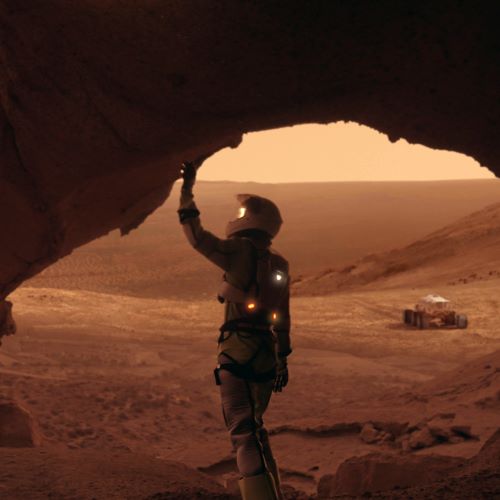21 November 2024

An Adelaide startup has adapted its world-first bioreactor technology for deployment in space, meaning biological supplements essential for human health in zero-gravity environments could be produced en route to Mars or beyond, rather than transported or resupplied from Earth.
Proteins like insulin, vital to maintaining astronaut muscle mass, bone density and overall cell function, could be produced as needed - preventing health issues like muscle atrophy and bone loss that astronauts would otherwise encounter on future long-term space missions.
OmnigenIQ cofounder and chief science officer, Tiffanwy Klippel-Cooper, says applications for the technology are dual-purpose across space and Earth, from the biological production of therapeutic proteins to support astronauts, to the on-site creation of surgical consumables or antibodies to aid disaster relief on our own planet.
“We're passionate about enhancing human health outcomes - especially in regional and remote places - and there is hardly a more remote place than space,” says Klippel-Cooper.
“We're excited about what this could mean for mission autonomy on longer-term space travel, and supporting the health of astronauts as we push further and further into the unknown."
OmnigenIQ are one of four early-stage startups from South Australia, Victoria, Japan and India hurtling into SA’s space ecosystem after completing Australia’s first space accelerator program, Venture Catalyst Space.
They bring the tally to 40 space startups the program has supported since 2018, representing a collective $43 million in declared funds from investment and grants and a total of 240 jobs.
South Australian Space Industry Centre Director Space Dr Catherine Grace, says the program’s national and global reputation for attracting innovative space startups ensures a reliable source of growth in the state’s space ecosystem.
“The Venture Catalyst Space program is a pivotal launchpad for local innovation and continues to empower space start-ups to scale-up and transform their cutting-edge ideas into sustainable space businesses,” Dr Grace says.
“The talent that emerges from the program year-on-year ensures a consistent pipeline of space startups with high investment potential.
“This is generating significant economic benefits for our state and is helping build critical space capability, further reinforcing South Australia’s position as an incubator for space innovation and technology.”
Access to new and more affordable space technologies is enabling smaller enterprises to enter the sector, reinforcing the critical role of acceleration programs like Venture Catalyst Space.
Craig Jones, UniSA Deputy Director: Business Incubation says diversification is key as the market for space-related products and services expands.
“Witnessing innovative early-stage startups redefine what’s possible continues to amaze me,” says Jones.
“We’re increasingly seeing investment interest in dual-use space technologies and services, meaning the technology has application in space as well as genuine capacity to solve terrestrial challenges.
“Each year, we see applications from passionate space entrepreneurs that push the boundaries of innovation; they are driven to build something that will have great impact in the world.”
The Venture Catalyst Space program is supported by South Australian Government funding through SASIC and delivered by the University of South Australia’s Innovation & Collaboration Centre (ICC).
In May, UniSA’s ICC and Australian Centre for Business Growth (AUCBG), in partnership with SASIC, launched the first Growth Ramp space scaleup pathway. The six-month program supports space companies with between five-11 employees that are ready to scale.
Venture Catalyst Space launched in 2018 to support the growth of South Australia’s space industry by providing early-stage technology-based space startups with the skills required to create a globally scalable enterprise.
END.
2024 Venture Catalyst Space cohort
|
OmnigenIQ (formerly KC Research & Solutions) |
OmnigenIQ is developing the first self-contained protein purification and bioreactor system for deployment in space. The system synthesises proteins vital to maintaining muscle mass, bone density, and overall cellular function, addressing health issues like muscle atrophy and bone loss experienced during long-term space missions. The system reduces reliance on transport and resupplies from Earth, lowering payload weight and reducing cost. |
|
RapidBeam |
RapidBeam is developing a rapidly scalable network of satellite communications terminals to unlock the full commercial capabilities of satellites, allowing huge amounts of data to be captured and delivered to the ground. |
|
Zharfire |
Zharfire is leveraging satellite imagery to support Australian viticulture efforts and combat impacts of climate change, identifying sensitivities of grapes to terroir factors like rain and temperature to improve fruit quality and yield. Combining satellite macroclimate data with ground-truth microclimate insights informs immediate tactics as well as long-term strategic plans. |
|
Onnes Cryogenics |
Onnes Cryogenics is developing next-generation fuel tanks for spacecraft and launch vehicles made from carbon fibre-reinforced plastic. This material is lighter and thinner than existing metallic tanks without compromising strength, also enabling mid-space satellite refuelling. |
The six-month Venture Catalyst Space accelerator program runs annually between May and November. Find out more about the program at icc.unisa.edu.au/space
The first cohort of the Growth Ramp space scaleup pathway completed their six-month program between May and November 2024. Learn more about this program via the AUCBG website.
……………………………………………………
Media contact: Leda Kalleske, Marketing, Communications and Projects, Innovation & Collaboration Centre
E: leda.kalleske@unisa.edu.au M: 0412 175 805




